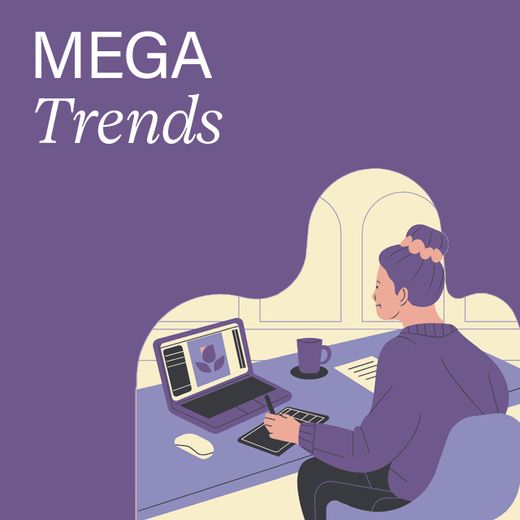Reflecting on the Great Reflection and Gen Z’s relationship with employers
How important is your organisation’s Purpose to your Gen Z employees? We’ve taken a look at the data…

- 5 minute read
- Future of Work
- Talent Attraction
Whenever there is an era-defining event, it’s interesting to see exactly which changes remain and which behaviours return to previous ways. The pandemic is perhaps the example par excellence and many LinkedIn posts were written examining the ways in which our post-pandemic lives would be irrevocably changed.
In the first of a series of blogs looking at those trends, we wanted to consider The Great Reflection as a response to employees’ need for a reset with their employers. In particular, a focus on organisational Purpose as a way to attract, motivate and retain staff. Especially how Gen Z’s attitudes towards Purpose have held up in the last three years.
The Great Reflection consists of four main themes:
- A new relationship with managers – instead of macho, hectoring management styles, leaders were encouraged to show vulnerability and understand their colleagues as people with lives outside work.
- Employees wanted to feel appreciated – not just pay rises but having their contribution acknowledged.
- Flexibility – beyond hybrid working, for those who have never worked from home (a majority of the working population), a desire to see practical demonstration of a belief in work-life balance, where colleagues could arrange work better, to fit important life events.
- Focus on purpose – having seen all sorts of pandemic heroes in unlikely places, like supermarket workers, lots of employees wanted a sense that their work matters to the outside world too.
The prevailing narrative from social research was that Gen Z wanted brands and businesses held to account over climate change and being a force for social good. Moreover, they expressed a clear preference for working for ethical brands that show good corporate citizenship behaviours. This led some to conclude that issues such as the climate crisis were more important attractors than traditional messaging around pay, benefits, job stability and career development.
But does this hold true today? And did it ever?
Most recent research – such as Deloitte’s 2023 Gen Z Survey – suggests that, while social issues remain important, this may also be a projection by an older generation keen to keep a lid on salary costs. The economic shocks arising from the pandemic and other global events, such as the war in Ukraine, have led to re-prioritisation in Gen Z’s job searching – with the cost of living coming top of their list of anxieties, along with unemployment.
The pre-pandemic narrative of a generation liberated by technology to tackle solutions to global problems has been superseded by very traditional fears over debt, salary and potential earnings. With good reason: according to the Institute of Student Employers (ISE), graduate salaries are now worth around £1700 less per year than they were a decade ago.
As well as political and economic impacts, Early Careers workers are also concerned about the rise of AI and how it will affect their jobs. As the most vulnerable part of the workforce – in terms of experience and leverage – they feel acutely the impact of living payday-to-payday on not just their prospects but their mental health. Cigna research reports a generation feeling overwhelmingly stressed, with 40% of Gen Z workers holding down at least two jobs just to make ends meet, according to Kantar.
And while they may be being impacted by events beyond their immediate control, they are doing what they can to tackle them – three-quarters of Gen Z workers plan to quit their jobs in the next 12 months. So, this has a real urgency for all employers considering their Early Careers workforce plans.
What does this mean for employers and what can they do?
- First, it doesn’t mean Gen Z no longer care about global issues around Purpose and climate change; rather, they are directly experiencing the impact of other things too. So don’t go ripping up Purpose statements or stop talking to Early Careers talent about the things you are doing to address, for example, social inequality.
- Instead, you need to show you are taking their concerns seriously and demonstrate real transparency in conversations around pay, progression, reward and recognition. Ask them for their views, discuss their concerns adult-to-adult.
- Remember, successful employer brands will be anchored in a balanced employee value proposition that has a positioning for both these more traditional career motivators as well as more purpose-led and macro issues.
The solution is to find this balance and communicate this in a way that feels authentic and is aligned to the lived realities of life at the company.
For the full story, click the button to download the white paper. And if you’d like to talk about how we can help you talk to candidates about what you can give them, we’d love to hear from you hello@thirtythree.co.uk.





